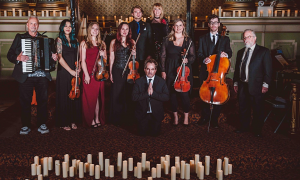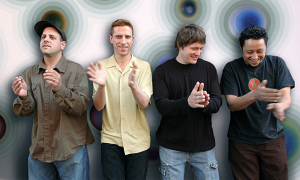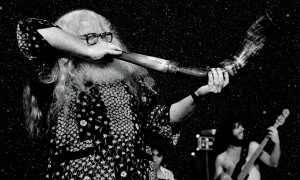Home » Jazz Articles » From the Inside Out » Innervisions, Improvisations and Other Jazz Fevers
Innervisions, Improvisations and Other Jazz Fevers
 Lili Añel
Lili AñelBetter Days
Winding Way Records
2019
Singer-songwriter Lili Añel and Better Days sound cut straight out of the northeast US. It's more than the geographic location of Añel's birth (Spanish Harlem, "El Barrio," in New York) or raised (South Bronx), and it's more than where Añel has based her career (Philadelphia, PA). It's in the sound and attitude of her music. The songs on Better Days address real situations in Añel's own life and in others with an emotional directness straight from that industrial Route I-95 northeast corridor and an emotional transparency direct from the Joni Mitchell singer-songwriter introspective confessional. (Añel honors Mitchell on Better Days by covering "Number One," Mitchell's sort of "Both Sides Now" rumination on the pleasant and painful aspects of professional competition.)
To accompany this very real sense of real-ness in her songs, Añel keeps soul and R&B in the neighborhood or at least around the corner of every verse and beat— for example, this slightly blue and somewhat jazzy take on Sly and the Family Stone's "Family Affair" that quite comfortably suits the mature wisdom of Añel's style and voice.
Keyboard player Dale Melton and drummer Jonathan Whitney threaten to melt two tunes with New Orleans fire and brimstone. After Añel rips open "Take It From Me" with a vocal line possessed by the voodoo preacher spirit of Doctor John, Melton both sweetens and deepens the sound with soulful organ while Whitney bounces drumbeats off of the horn refrains to kick up its funky Crescent City rhythm. In the leadoff track "Thin Line," Melton and Whitney toss around swivel-hipped New Orleans sounds like they're throwing hot dice, while Anel's voice dives and swims in their powerful currents. Jeffrey Blount slaps and pops his bass solo into the airy break, while saxophonist Korey Riker and trumpeter Christopher Stevens chirp in sharp jazz-pop sliced from a Steely Dan tart. Leaving Anel's joyous closing shout "Put some beans in it!" as the music fades was an excellent production decision that helps this tune and Better Days leave a great taste behind.
 Benjamin Boone
Benjamin BooneJoy
Origin Records
2020
Benjamin Boone's set with this band born and grown in Ghana is a genuine cross-cultural jazz Joy.
The seeds of Joy were planted when composer-saxophonist Boone spent a year as a US Fulbright Scholar in Ghana in sabbatical from his professorship at California State University (Fresno), to study the country's music and musical traditions. The music Boone found made him feel at home: "These guys know American jazz inside and out—but with a definite Ghanaian twist," he explains.
The Ghana Jazz Collective boasts an amazingly dexterous and powerful rhythm machine: After studies at Berklee, pianist Victor Dey Jr. went on to perform with such stars as Stevie Wonder, Hugh Masekela and Courtney Pine, and received "Musician of the Year" at the 2014 Vodafone Ghana Music Awards. Drummer Frank Kissi won 2014 "Instrumentalist of the Year" at those same Awards. And listening to bassist Bright Osei is like trying to swallow the ocean one bucketful at a time: The bubbling and torrent of rhythmic and harmonic movement just won't stop pouring out of his fingertips into his instrument and Osei is simply magnificent throughout this set of Joy.
During his time in Ghana, Boone was invited to sit in with the band at the 233 Jazz Bar & Grill in Accra. "The 233 Jazz Bar" re-extends this invitation into technicolor big city club funk via Osei's room-shaking, finger-popping bass line. Electric keyboards float synthetic chords that tie the rhythm and melody together, and Boone sprints (not steps) into his solo like he's already three minutes late and must catch up!
"The Intricacies of Alice" presents a dynamic musical portrait of the leader's wife and one of the band's favorite originals. "Alice can be a number of things at once, wickedly sardonic and funny while at the same time full of empathy," Boone explains. "The band thinks this tune is a hoot, alternating between three different grooves and two meters, because they know her, and know it fits." It certainly sounds like the band plays this tangled steeplechase of saxophone and piano solos in several different ways from more than one direction.
"Curtain of Light" and "Maiden Voyage" (Herbie Hancock) also highlight this set's joyful marriage of African and American music. "Curtain of Light" builds upon an ancient Ethiopian musical mode (written by a jazz instructor at Addis Ababa University, where Boone served in residence) into a massive explosion of communal jazz expression, with pianist Dey playing the part of McCoy Tyner to complement Boone's yowling, John Coltrane-like soprano sax. Bassist Osei and drummer Kissi drive "Maiden Voyage" all the way from America to Africa to Brazil, with Sandra Huson's wordless vocals painting sound clouds that float about Dey's beautifully reflective solo spot.
"In Ghana, music is participatory, egoless, and woven into the very fabric of existence," Boone says. "People live with Joy and make music with Joy."
 BossaCucaNova E Roberto Menescal
BossaCucaNova E Roberto MenescalBossa Got The Blues
Six Degrees Records
2019
Listening to BossaCucaNova creates the impression that you're driving an exquisite Italian sportscar on a leisurely and sunny Sunday afternoon. You can hear the smooth purr of the engine powering your rhythm, soft but ferocious, a napping tiger, through the open window. Slicing through the breeze moderates its temperature so that it feels both warm and cool— simply perfect— on your skin. You turn to the left and the right and smile to return the greetings extended by the colorful and inviting scenery bathing in the golden light of that friendly sun above. Bossacucanova makes every day feel better than a good day—feel like a simply perfect day—for a nice ride.
Bossa Got The Blues maintains the preeminence of Bossacucanova—Alex Moreira on keyboards, Marcelinho Da Lua on scratches and samples, and Marcio Menescal on Fender and keyboard bass—among contemporary Brazilian bands whose sound springs from filtering traditional bossa nova through modern production and electronica. It also showcases one of the founding fathers of bossa nova guitar: guitarist, composer, and producer Roberto Menescal, who wrote the famous "O Barquinho (Little Boat)" and happens to be father of Bossacucanova bassist Marcio. (Father also joined son and crew for the band's 2001 global debut Brasilidade [Zuirigiboom/Six Degrees].)
Thanks to Papa Roberto, Bossa Got The Blues and some sweet, swinging Grant Green jazz guitar, too, all wrapped up in Bossacucanova's trademark luxurious 1960s production and presentation. Flavio Guimarães' harmonica leads "Laudir's Theme" out from a Brazilian jungle into an acoustic blues, his howls and wails pouring down on the guitar hook like sweet and sticky syrup. Leo Gandleman, whose saxophones have graced recordings by Gilberto Gil and other Brazilian stars for four decades, also climbs onboard to sing the blues.
These ten tracks would split and retrofit quite nicely into two sides of a vinyl LP, and Gandleman plays on the songs that would close side one (track five, "Blue Bossa") and two (track ten "Galeria Menescal"). "Blues Bossa" cribs the melody to "Don't Get Around Much Anymore" before opening up a dance floor jointly rocked by Menescal's electric guitar chords and Gandelman's moaning and groaning baritone and tenor saxophones. Gandelman adds tenor, baritone and flute in a lovely dance with acoustic guitar and vibraphone to "Galeria Menescal" (which opens, in case you missed all the old school, with the sound of a needle coming down on a vinyl album).
Yes, you could downshift and grind your Bossacucanova sportster into a deeper, harder and more powerful gear. But when you feel as good as the sound of Bossa Got the Blues!, why mess with simply perfect?
 Jazz at Lincoln Center Orchestra with Wynton Marsalis
Jazz at Lincoln Center Orchestra with Wynton MarsalisThe Music of Wayne Shorter
Blue Engine Records
2019
As a saxophonist, founding member of Weather Report and member of Miles Davis' second great acoustic Quintet, it won't be hard to find Wayne Shorter's name in the pages of modern jazz history. But the massive The Music of Wayne Shorter highlights a sometimes-overlooked element of Shorter's musicianship: His ability to compose, which has contributed "Footprints," "Nefertiti," "Speak No Evil" and other standards to the jazz canon. As bassist Christian McBride, a former member of Shorter's quartet, writes in the notes to this set: "Wayne's music has become basic instrumental vocabulary for all of who came after him. For anyone wishing to play jazz, it is a must that you come through the music of Ellington, Monk, and Shorter."
Ellington and his Orchestras are an essential reference point for these JALC Orchestra retellings of ten Shorter originals, all featuring the composer as soloist. Close your eyes while listening to the opening "Yes or No" and it's easy to imagine dapper Duke Elllington And His Orchestra fronting his orchestra, snapping his fingers with sophisticated cool as he wraps the traditional yet hip orchestral sound around vibrant solos from Shorter on saxophone, JALC Orchestra Music Director Wynton Marsalis on trumpet and Dan Nimmer on piano.
"Hammer Head" swims in and out of deep blue orchestral swing, with Shorter's tenor and Sherman Irby's alto dancing together while Gardner's trombone nuzzles up to the rhythm section for more earthy, funky pleasures. "Contemplation" slows to a purposeful stroll and spotlights only Shorter, who lingers in liquid lines that seem to float upward and then vanish like blue smoke before closing with a stylistic love letter to swing tenor giants like Ben Webster.
The collective sound and vision grow even larger and stronger as this set progresses through disc two. "Armageddon" swaggers through some blues until it stumbles and breaks into the sound of things falling apart but then resolutely rebuilds the original riff and settles into a slick stride, kept slippery by pianist Nimmer's plump chords, by the end of Shorter's solo. Trumpeter Marcus Printup and drummer Ali Jackson kick up dust from New Orleans in their solos, too.
The set-ending "Mama 'G'" is a full-throttle instrumental solo round blowout. Shorter leans in and makes sure his final turn counts: Each studied pause lines up the perfect spot, then his tenor howl jumps back into the rhythm, turning notes into phrases, turning these phrases inside out and upside down, then splattering those notes back out into new patterns. "Mama 'G'" is the perfect celebratory sound to end The Music of Wayne Shorter.
 Pat Metheny
Pat MethenyFrom This Place
Nonesuch Records
2020
When a musician of Pat Metheny's pedigree writes, "From This Place is one of the records I have been waiting to make my whole life," it seems prudent to listen.
Each of these ten new compositions seems to reflect a different aspect of Metheny as composer and guitarist, casting his bright and articulate voice in various configurations of his core band (Welsh pianist Gwilym Simcock, Malaysian/Australian bassist Linda May Han Oh, and drummer Antonio Sanchez, whose tenure with the guitarist reaches back to 2002's kaleidoscopic Speaking of Now [Warner Bros.]), plus guests MeShell NdegeOcello (vocals), Gregoire Maret (harmonica), and Luis Conte (percussion), along with the Hollywood Studio Symphony orchestra.
Listening to From This Place is like drinking from a firehouse: There is just so much great music that it's almost mind-boggling to hear it all in one sitting. Make the time to take your time with this one.
Simcock's capacity to engage musically and emotionally on piano with Metheny's guitar honors the memory of Lyle Mays' beautiful tenure in the Pat Metheny Group with a warm and bright glow. Simcock opens the ballad "You Are" with a twinkling piano lullaby that slowly but steadily grows stronger but remains supple. When the sound of Sanchez' wordless vocal helps the rhythm rise and swell, the leader's circle back to his own First Circle (1984, ECM) sounds complete, and piano tucks away the song for the night under a soft blanket of gorgeous notes.
The opening widescreen travelogue journeys for more than thirteen sprawling minutes and reaches several exhilarating destinations but still leaves "America Undefined." Simcock sounds mellow piano chimes to counterpoint Metheny's guitar, then jackrabbits into a steeplechase with the rhythm section to drive the melody hard. The second half of "America Undefined" kind of sounds like the first half of "America Undefined" just floats up into the air and disintegrates into pieces: Weird electronic sound wobbles across the speakers, a clanging train bell zips past, the music collapses upon itself and then explodes like a brilliant star in a bluesy march full of atmosphere and orchestral strings and power and majesty...a genuine cinematic treat for your ears, a truly awesome composition, and most likely one of Metheny's best.
The title track was inspired by the seismic shift in US politics institutionalized by the November 2016 election, with vocalist Meshell Ndegeocello breathing soul and fire into Metheny's lyrics. Conductor Joel McNeely swaddles "Love May Take Awhile," another Metheny guitar ballad so lyrically beautiful you almost feel him singing through his guitar strings, in the sweet orchestral sound of Nelson Riddle and may be the guitarist's cautionary response to his own title track.
From This Place is a genuine masterpiece because it simultaneously consolidates all the styles in which we've heard Pat Metheny play but does more than just look back: It steps into new directions and sounds that make his future seem as exciting as his legendary past.
 Bobby Previte
Bobby PreviteMusic from the Early 21st Century
Rare Noise Records
2020
Music from the Early 21st Century presents music captured during a brief trio tour by keyboardist Jamie Saft, guitarist Nels Cline and drummer Bobby Previte, performing completely improvised music. "Fundamentally, it's based around the classic organ trio formation—drums, Hammond organ and guitar," Saft explains. "But it just blows up the language to so many different universes."
"Captured during a brief trio tour" doesn't do justice to this wild, ravenous sound. Trapped and caged like a snarling animal seems more like it.
Each track takes its inspiration from a colloquial expression that emerged in 21st century American English. Cline opens "The Extreme Present" by banging the chords to "Sgt. Pepper" together like clanging metal pots, calling out Saft's sheets of thick and heavy chords. Guitar and keyboard jointly veer off into their own solo directions, until Cline's guitar finally settles into a blues groove line that quickly swirls into a blizzard of white sound. "Totes" doesn't open as much as it seems to float, with Cline worrying his guitar strings like an anxious person does their fingernails until all three musicians blissfully settle into the same glistening chord, knitting the music tightly together in rare unified time. "The Extreme Present" is also an excellent description of how Saft, Previte, and Cline recorded this set.
Previte sets up a solid drum floor to prop up "Paywall," a sturdy spot from which Cline and Saft trade hard and heavy guitar and keyboard riffs, fracturing the music's surface into overlapping ripples. Previte, Saft and Cline do an amazing job with spacing in such dense music, keeping out of but still connecting to the other sounds like you're listening to two or even three separate pieces of music that sometimes intersect to create a completely new thing.
The closing "Flash Mob" sounds like an after-hours party hosted by the machines in a shuttered video game arcade. The trio opens with a bit of straight funk, with Previte thumping out the drum heartbeat, Saft belching out keyboard basslines like heartburn, and Cline chopping out guitar to keep the beat moving. Halfway in, "Flash Mob" falls apart, leaving each instrument to wander until organ cues the closing and all three instrumental sounds wander safely home.
"If you've improvised for many years, that music can be spontaneous and exciting and deep. It can visit countries that one could never write down in one's wildest imagination," Previte suggests. "Once the three of us got together, it was obvious that this band discovered a territory that has not been well explored."
Tracks and Personnel
Better DaysTracks: Thin Line; Better Days; Number One; Take It From Me; The Wrong Time; Family Affair; Peace of Mind; Supposed To Be; George Bailey's Lament.
Personnel: Lili Añel: vocals, acoustic guitar; Dale Melton: grand piano, Fender Rhodes, Hammond B-3; Jeffrey Blount: bass; Jonathan Whitney: drums, percussion; John Lilley: electric guitar; Korey Riker: tenor saxophone, baritone saxophone, alto saxophone; Christopher Stevens: trumpet, flugelhorn.
Joy
Tracks: The Intricacies of Alice; Maiden Voyage; Slam; Curtain of Light; The 233 Jazz Bar; Without You; Joy.
Personnel: Benjamin Boone: alto and soprano saxophone; Bernard Ayisa: tenor saxophone; Victor Dey, Jr.: keyboards; Bright Osei: bass; Frank Kissi: drums; Sandra Huson: vocals.
Bossa's Got the Blues
Tracks: 1937; Mandacaru; Train to Ipanema; Sambalaya; Blues Bossa; Laudir's Theme; Bossa Got The Blues; Klaunga Rocket; Vou Nessa; Galeria Menescal.
Personnel: Cris Delanno: vocals; Laudir DeOliveira: percussion; Renato Endrigo: percussion; Leo Gandelman: saxophones, flute, horn arrangements; Flávio Guimarães: harmonica; Marcelinho Da Lua: sampling, scratching; Carlos Malta: bass flute, piccolo; Márcio Menescal: Fender Jaguar, synthesizer bass; Roberto Menescal: arranger, composer, electric guitar; Jota Moraes: vibraphone; Alex Moreira: Fender Rhodes, Hammond B3, synthesizer; Ian Moreira: percussion; Sidinho Moreira: percussion; Rio Maracatu: percussion; Paulinho Trompete: flugelhorn, horn arrangements, trombone, trumpet.
The Music of Wayne Shorter
Tracks: Disc One: Yes or No; Diana; Hammer Head; Contemplation; Endangered Species; Disc Two: Lost; Armageddon; The Three Marias; Teru; Mama "G."
Personnel: Sherman Irby: alto and soprano saxophones, flute, piccolo, Bb clarinet; Ted Nash: alto and tenor saxophones, C And alto flutes, piccolo, Bb clarinet; Victor Goines: tenor saxophone, Bb and Eb clarinets; Walter Blanding: tenor and soprano saxophones, Bb clarinet; Paul Nedzela: baritone and alto saxophones, bass clarinet; Ryan Kisor: trumpet; Kenny Rampton: trumpet; Marcus Printup: trumpet; Wynton Marsalis: trumpet; Vincent Gardner: trombone; Chris Crenshaw: trombone; Elliot Mason: trombone; Dan Nimmer: piano; Carlos Henriquez: bass; Ali Jackson: drums.
From This Place
Tracks: America Undefined; Wide and Far; You Are; Same River; Pathmaker; The Past in Us; Everything Explained; From This Place; Sixty-Six; Love May Take Awhile.
Personnel: Nico Abondolo: bass; Charlie Basharat: violin; Jacqueline Brand: violin; Jacob Braun: cello; Laura Brenes: french horn; Rob Brophy: viola; Eric Byres: cello; Heather Clark: flute; Stuart Clark: clarinet; Luis Conte: percussion; Stephen Dress: bass; Alma Fernandez: viola; Lorenz Gamma: violin; Jessica E. Guideri: violin; Trevor Handy: cello; Dylan Hart: french horn; Tamara Hatwan: violin; Amy Hershberger: violin; Dan Higgins: clarinet; Steven Holtman: trombone; Alex Iles: trombone; Benjamin Jacobson: violin; Maia Jasper White: violin; Steve Kujala: flute; Songa Lee: violin; Phillip Levy: violin; Dane Little: cello; Larry Mah: Pro-Tools; Shawn Mann: viola; Grégoire Maret: harmonica; Serena McKinney: violin; Joel McNeely: conductor; Pat Metheny: arranger, composer, guitars, keyboards; Meshell Ndegeocello: lyricist, vocals; Helen Nightengale: violin; Linda May Han Oh: arranger, bass, vocals; Jenn Olsen: flute; Sara Parkins; violin; Bill Rechenbach: trombone; Lynn Richburg: viola; Alison Riley: lyricist; Antonio Sanchez: drums; Andrew Shulman: cello; Gwilym Simcock: arranger, piano; Tereza Stanislav: violin; Sarah Thomblade: violin; Cecilia Tsan: cello; Diana Wade: viola; Dave Walther: viola; Roger Wilkie: violin.
Music from the Early 21st Century
Tracks: Photobomb; Paywall; Parkour; The Extreme Present; Totes; Occession; The New Weird; Machine Learning; Woke; Flash Mob.
Personnel: Jamie Saft: Hammond organ, Fender Rhodes, MiniMoog; Nels Cline: electric guitar, effects; Bobby Previte: drums.
< Previous
Reptiles
Next >
Won't Put No Flag Out
Comments
Tags
From the Inside Out
Chris M. Slawecki
Lili Anel
Joni Mitchell
Sly Stone
Dale Melton
Jonathan Whitney
Doctor John
Jeffrey Blount
Korey Riker
Christopher Stevens
steely dan
Benjamin Boone and the Ghana Jazz Collective
Benjamin Boone
Victor Dey Jr.
Stevie Wonder
Hugh Masekela
Courtney Pine
Frank Kissi
Bright Osei
Herbie Hancock
McCoy Tyner
John Coltrane
Sandra Huson
Bossacucanova E Roberto Menescal
Bossacucanova
Alex Moreira
Marcelinho Da Lua
Marcio Menescal
Roberto Menescal
Grant Green
Leo Gandleman
Gilberto Gil
Jazz at Lincoln Center Orchestra with Wynton Marsalis
Weather Report
Miles Davis
Wayne Shorter
Christian McBride
Duke Elllington
wynton marsalis
Dan Nimmer
Sherman Irby
ben webster
Marcus Printup
Ali Jackson
pat metheny
Gwilym Simcock
Linda May Han Oh
Antonio Sanchez
Meshell Ndegeocello
Gregoire Maret
Luis Conte
Hollywood Studio Symphony
Lyle Mays
Joel McNeely
Nelson Riddle
Bobby Previte, Jamie Saft and Nels Cline
Jamie Saft
Nels Cline
Bobby Previte
For the Love of Jazz
 All About Jazz has been a pillar of jazz since 1995, championing it as an art form and, more importantly, supporting the musicians who create it. Our enduring commitment has made "AAJ" one of the most culturally important websites of its kind, read by hundreds of thousands of fans, musicians and industry figures every month.
All About Jazz has been a pillar of jazz since 1995, championing it as an art form and, more importantly, supporting the musicians who create it. Our enduring commitment has made "AAJ" one of the most culturally important websites of its kind, read by hundreds of thousands of fans, musicians and industry figures every month.






















